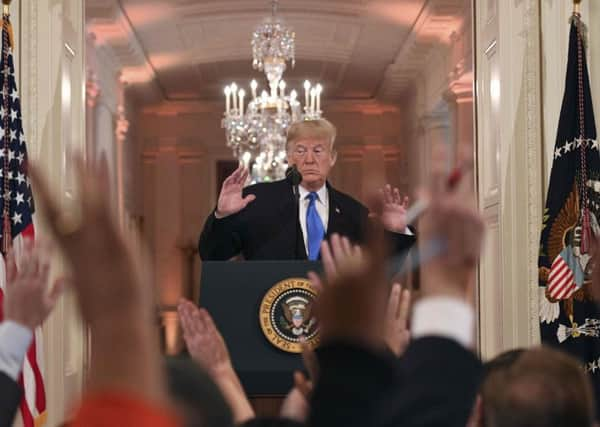US Attorney General '˜quits' at Trump's request as Democrats take control of House


Attorney general Jeff Sessions resigned last night as US chief law enforcement officer after enduring more than a year of blistering and personal attacks over his recusal from the Russia investigation.
Mr Sessions announced his resignation in a letter to President Donald Trump, saying the move came at “your request”.
Advertisement
Hide AdAdvertisement
Hide AdMr Trump announced in a separate tweet that he was naming Mr Sessions’ chief of staff Matthew Whitaker, a former United States attorney from Iowa, as acting attorney general.
The resignation was the culmination of a toxic relationship that frayed just weeks into the attorney general’s tumultuous tenure, when he stepped aside from the investigation into Russia’s role in Mr Trump’s 2016 presidential election campaign.
The president blamed the decision for opening the door to the appointment of special counsel Robert Mueller, who took over the Russia investigation and began examining whether Mr Trump’s hectoring of Mr Sessions was part of a broader effort to obstruct justice and hinder investigators.
The relentless attacks on Mr Sessions came even though the Alabama Republican was the first US senator to endorse Mr Trump and despite the fact that his crime-fighting agenda and priorities – particularly his hawkish immigration enforcement policies – largely mirrored the president’s.
But the relationship was irreparably damaged in March 2017 when Mr Sessions, acknowledging previously undisclosed meetings with the Russian ambassador and citing his work as a campaign aide, recused himself from the Russia investigation.
The decision infuriated Mr Trump, who repeatedly lamented that he would have never selected Mr Sessions if he had known the attorney general would recuse. The recusal left the investigation in the hands of deputy attorney general Rod Rosenstein, who appointed Mr Mueller as special counsel two months later after Mr Trump fired then-FBI director James Comey.
The rift lingered for the duration of Mr Sessions’ tenure, and the attorney general, despite praising the president’s agenda and sticking to his priorities, never managed to return to Mr Trump’s good graces.
The deteriorating relationship became a soap opera stalemate for the administration. Mr Trump belittled Mr Sessions but, perhaps following the advice of aides, held off on firing him. The attorney general, for his part, proved determined to remain in the position until dismissed.
Advertisement
Hide AdAdvertisement
Hide AdNews of Mr Sessions’ departure came after Mr Trump warned the new Democratic majority in the House of Representatives that he will retaliate if they investigate him.
The president said in a White House press conference held the day after the US midterm elections: “Investigate me, and I’ll investigate you – and the government will grind to a halt.”
Democrats seized the House majority from Republicans but the “blue wave” did not reach the Senate where Mr Trump’s party gained ground while some key state governorships remained in the red column.
The new Democratic House majority will end Republican dominance in Washington for the final two years of Mr Trump’s first term, with major questions looming about health care, immigration and government spending.
The president’s party will maintain control of the executive and judicial branches of the government, in addition to the Senate, but Democrats suddenly have a foothold that gives them subpoena power to probe deep into Mr Trump’s personal and professional dealings and his long-withheld tax returns.